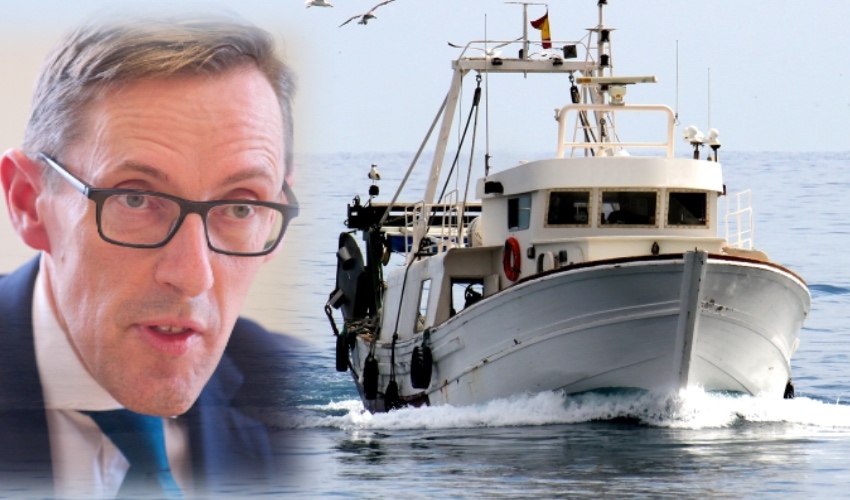


Jersey has reached an agreement with the EU that it hopes will calm a heated international dispute over fishing rights.
Tensions were high after French fishermen, backed by regional and national politicians, said that Jersey was denying them access to traditional fishing grounds, following the UK’s departure from the EU on 31 December.
Under the EU/UK trade deal, the Bay of Granville Agreement – a ‘shared management’ arrangement signed in 2000 that allowed French fishermen holding an appropriate licence to fish in Jersey’s territorial waters up to three miles of the Island – fell away.
In its place, the EU and UK agreed that Jersey should take back control of its waters but issue licences fairly to both French and Jersey fishermen, based on historical data which proved that the licence holders were still using them.
However, a transitional arrangement – effectively continuing the terms of the Bay of Granville Agreement until the end of April, giving time to Jersey to receive, process and issue new licences – was proposed by Jersey but then rejected by the EU for failing to satisfy "strict legal requirements."

Pictured: The External Relations Minister confirmed that the EU had rejected Jersey's transitional fishing plan because it did not satisfy "strict legal requirements."
Although Jersey issued 57 licences to French boats which they knew met the criteria, this did not satisfy the French.
Not only did the country’s Fisheries Minister tell French media that she wanted Jersey cut from the UK/EU trade deal in favour of a return to the Bay of Granville Agreement but also Jersey fishermen were refused permission to land their catch in France.
Now, however, following a meeting on Monday between External Relations Minister Ian Gorst and EU Fisheries Commissioner Virginijus Sinkevičius, the EU has accepted Jersey’s original transitional plan.
Good meeting with @VSinkevicius to resolve issues relating to transitional arrangements for access to Jersey waters while we work to issue permanent licenses in line with TCA requirements. See statement in previous tweet. Details to be finalised with UK and EU, as parties to TCA https://t.co/4iThX1uWtG
— Senator Ian Gorst (@Ian_Gorst) January 26, 2021
In a statement, the Government said: “On Monday 25 January, Virginijus Sinkevičius, the EU Fisheries Commissioner, and Senator Gorst, confirmed the political commitment of the European Commission and the Government of Jersey to formalise transitional arrangements for EU vessels fishing in Jersey waters.
“The transitional arrangements formalise an amnesty period in which those vessels that had held Granville Bay Area permits to fish Jersey waters before the provisional application of the Trade and Cooperation Agreement will continue to have access to Jersey waters until the end of April 2021.
“The details of these transitional arrangements will now be confirmed in writing, once they have been finalised by the UK, EU and Jersey. Meanwhile, the historic data needed to enable full TCA permits to be issued as soon as possible to qualifying vessels will be collected and transmitted to the relevant authorities.”
A joint statement with the Environment Minister following a positive call I had yesterday with the EU Commissioner for Environment, Oceans and Fisheries @VSinkevicius pic.twitter.com/ycKe5DGY1c
— Senator Ian Gorst (@Ian_Gorst) January 26, 2021
Asked by Express whether he thought Jersey fishermen would be happy at the news, Senator Gorst said: “I fully appreciate the difficulty of the situation that local fishermen face, as does the Minister for the Environment, but it is very important that we abide by the terms of the new agreement, which I believe will benefit the industry in the medium and longer term.
“There have been difficulties around access to markets and I’m hopeful that this agreement with the Commissioner will mean that those difficulties are alleviated. Of course, fishermen will still need to fill in the required paperwork, but our Marine Resources team will be able to offer support.”
Senator Gorst said that the EU’s initial failure to accept the transitional period appears to have been a “misunderstanding” on their part, but he added: “What is important is that it was a very positive meeting, there was good cooperation with all parties involved, a pragmatic approach was taken, and we can now move forward."
Senator Gorst said he did not think that French boats would now rush into Jersey waters to make up for lost time and fish.

Pictured: Jersey took back full licensing control of its territorial waters on 1 January, as part of the UK/EU trade deal.
“There is no reason to believe that there will be extra pressure on our waters during the amnesty period. Winter is, of course, a quieter period anyway when the weather limits fishing opportunities and demand for fish has also been suppressed by Covid, with restaurants closed.
“What is important is that this amnesty has now been politically agreed, and Guernsey too now has signed an interim bulk licence agreement, so there are now transitional agreements across the Channel Islands, as well as the UK."
Environment Minister John Young added: “I am pleased we have been able to confirm that our plans for an amnesty period have the support of our partners. I believe that this solution would provide a workable transition to the new agreement as well as reassurance for our closest EU neighbours in France who have traditionally fished in our waters for many years.
“Our officers continue their work to process and issue the Jersey licences to qualifying vessels as required by the Trade Cooperation Agreement.
“It is important that we implement these new arrangements as soon as possible to ensure a sustainable future for our fishery and local fleet.”
Comments
Comments on this story express the views of the commentator only, not Bailiwick Publishing. We are unable to guarantee the accuracy of any of those comments.